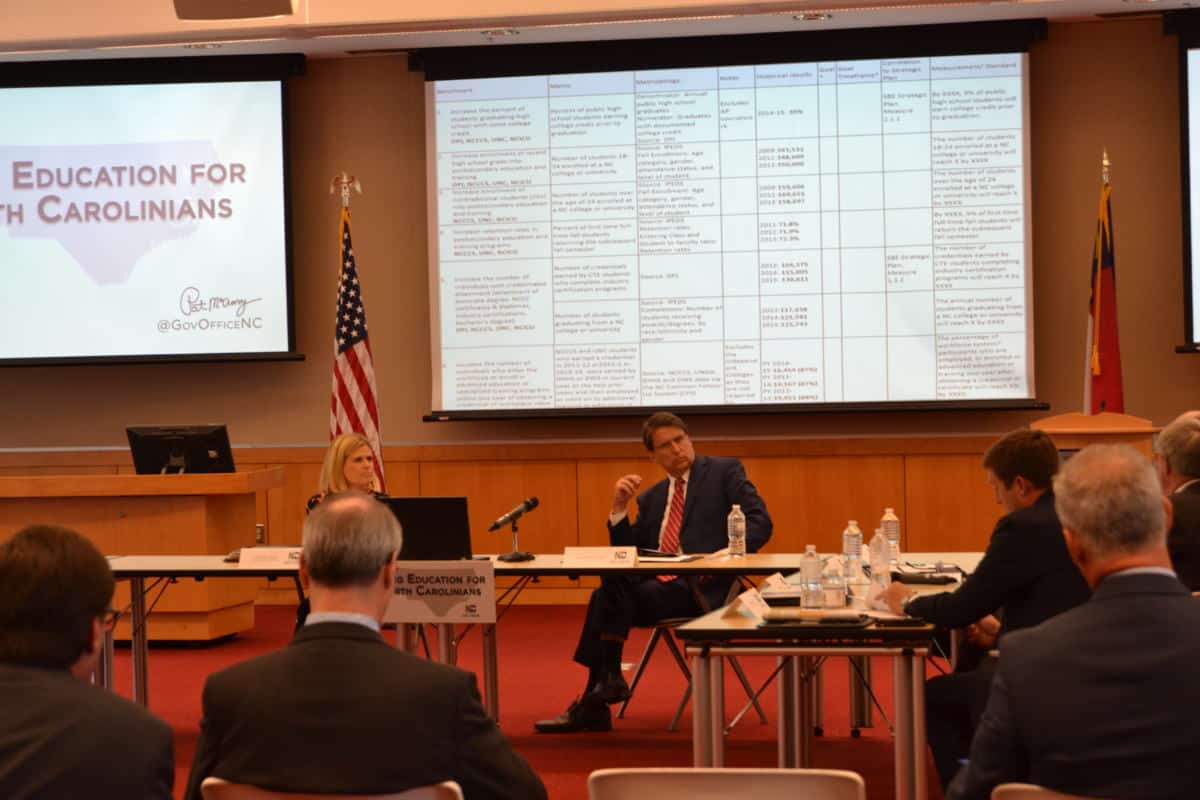Education Cabinet
The governor’s education cabinet met last Tuesday at the Friday Institute to discuss the state’s work and future goals for education.
State budget director Andrew Health gave an update on the Connect NC bond, which passed on a referendum in March to improve campus infrastructure. Health said the projects from the $2 billion bond — the first statewide bond since 2000 — should touch 70 percent of N.C. counties and all 58 community college campuses. In the first year, $160.3 million out of $187.3 million will be invested in education, Health said. The other funds will go to needs in public safety, agriculture, and state parks and zoos.
Out of the investments in education, Health said 43 percent of the funds will be invested in community colleges, 44 percent in universities, and 13 percent in state agencies.
Catherine Truitt followed with a presentation on some of the state’s education goals — the focus being on the “67Works” campaign to have 67 percent of the state’s working population with some education or training beyond high school by 2025.
Nationwide, Truitt said only one percent of jobs have gone to people with only a high school diploma in the years since the recession. Without further credentials or schooling, “you haven’t been able to participate in this recovery,” Truitt said.
The education cabinet appointed a working group in the spring that worked with the governor’s office to create benchmarks that will help measure progress toward the goal. A dashboard and website are under works to share and promote the campaign.
Rebecca Tippett, director of Carolina Demography, presented on ways to move closer to the 67 percent goal. She explained the state’s current demographic makeup and where significant differences exist in the population’s attainment — in age, sex, place of birth, and race/ethnicity.
Then for each disparity, she showed how many additional individuals would have some form of education or training after high school if the state focused in on reaching just that group.
For example, if young men’s attainment caught up to young women’s, that would add 167,000 young men to those North Carolinians who have achieved postsecondary education. Currently, there’s a 15 percentage point gap between young men and women. Similarly, if the state focused on just U.S.-born minorities having the same levels of education as whites, 103,000 additional individuals would have education or training beyond high school.
New Teachers Program
The North Carolina New Teachers Program (NCNTP) hosted an institute for almost 200 first-year teachers throughout the state in Raleigh last Friday. Instructional coaches from different regions of the state put on workshops to share effective teaching strategies and practices with participants.
The institute is one of two that the program coordinates each year as part of an effort to support teachers in their first three years in the classroom.
“The idea is, what can we do in classrooms to enhance instruction?,” said Jerad Crave, an instructional coach in the Western Carolina University region.
Workshop topics varied from specific topics, like how to teach exceptional children in general education classrooms, to broader themes, like how to establish authentic relationships with students.
The coaches used methods as they taught techniques that the teachers could go back and replicate. In “Establish Authentic Relationships with Your Students,” Mark Meacham from the UNC-Greensboro region had teachers pull out an object from their purse, pocket, or bag that was meaningful to them. The “pocket activity,” he said, is an easy way to begin to build a connection with a student.
In “Create Student-Centered Classrooms: Voice & Choice,” Jennifer Beck (WCU region), Tierney Fairchild (UNC-Charlotte), and LaTonya Gaines-Montgomery (UNCC), had teachers participate in a socratic seminar — a type of open discussion that can work to explore topics for all age groups.
Peter Hasselberg, a teacher in his first year at Southern Vance High School in Henderson, has been struggling in his first few weeks of teaching.
“Some of my freshman students are really hard to reach and they’re not motivated,” Hasselberg said. The authentic relationship-building workshop, he said, gave him some useful ideas.
Competency Based Learning
Last week, the House Select Committee on Education Strategy and Practices met to discuss a variety of education issues, including competency based learning.
In essence, competency based learning or education is where a student is able to learn at his or her own pace. When the student can demonstrate proficiency at some particular level of a subject, he or she is then able to move on to a higher level of difficulty.
Increasingly, legislators are discussing ways to better incorporate competency based learning in the state’s education system.
During the committee meeting, legislators heard from a variety of experts on the subject.
Dale Frost, the state policy director of the International Association for K-12 Online Learning broke down exactly what competency based learning is for the attendees of the committee, including a five-part definition of its attributes.
Students advance upon demonstrated mastery.
Competencies include explicit, measurable, transferable learning objectives that empower students.
Assessment is meaningful and a positive learning experience for students.
Students receive timely, differentiated support based on their individual learning needs.
Learning outcomes emphasize competencies that include application and creation of knowledge, along with the development of important skills and dispositions.
Click here for Frost’s presentation.
Paul Leather, deputy commissioner of the New Hampshire Department of Education, spoke via video conference about that state’s experience with competency based learning. In his presentation, he emphasized that expecting students to become college and career ready requires that students be able to move at their own pace.
“Our system must advance students as they demonstrate mastery of content, skills and dispositions, which requires a comprehensive system of educator and school supports,” his presentation stated.
Click here for Leather’s presentation.
Finally, Rebecca Garland, deputy state superintendent of North Carolina’s Department of Public Instruction, and Sneha Shah-Coltrane, director of Advanced Learning and Gifted Education at NC DPI, talked about our state’s experience with competency based learning.
During their presentation, they talked about a version of competency based learning called Credit by Demonstrated Mastery. Basically, this is a system by which students can get credit for a high school course without actually taking the course as long as they can show a “deep understanding of the content.”
According to Shah-Coltrane and Garland’s presentation, 92 percent of school districts in the state are incorporating Credit by Demonstrated Mastery in some way.
“We have evidence that shows that students who have earned credit via CDM continue to be successful in the next course in the sequence,” their presentation stated. “We believe in the process and want to continue to offer the opportunity.”
Click here for Shah-Coltrane and Garland’s presentation.
Innovation Lab
BEST NC along with RTI International had their 3rd annual Excellence Education Innovation Lab last week. The goal of the event was to talk about how to “to increase student achievement in North Carolina through better recruitment and retention of highly effective, well-prepared, diverse, and supported teachers,” a press release stated.
Also according to the press release, the event brings together a nonpartisan group that includes educators, policy makers, business leaders, and others to talk about teacher recruitment and retention.
View a video below put together by the host groups on the 2016 Excellence Innovation Lab.
Elevating Teachers
This past weekend, a teacher led and created event brought teachers from North and South Carolina together for networking, an exchange of ideas and best practices, and collaboration. The event, called Elevating and Celebrating Effective Teaching and Teachers (ECET2 Carolina), was held in Charlotte Saturday and Sunday. As part of the event, a Teacher Leaders Panel Discussion talked about empowering teachers and expanding the reach of educator leaders.
Below is a video of the panel. From left to right are:
Ben Owens: math and physics teacher at Tri-County Early College and a National Hope Street Group Fellow
Danielle McCaslin: Wake County middle school science teacher and 2012 Kenan Fellow
Nicole Smith: math teacher at Mooresville High School
Kevika Amar: English teacher and principal at Kipp Pride High School in Northeast NC and a current senior principal policy advisor at the U.S. Department of Education




